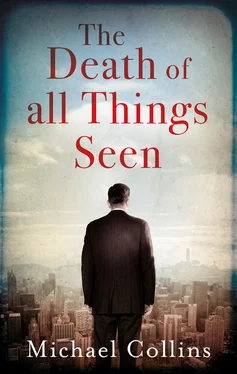He said it in a way so it was the distilled truth of what he had felt for a long time, and to say it with a measure of dignity, in one sentence, seemed enough.
‘I auditioned for a short piece Norman was staging. He agreed to give me pointers. I was moved in with him before I was decided what I felt about any of it. I was on his sofa for a month, not paying rent, and, in the day, reading parts that weren’t me. Norman helped, then didn’t. I was just there on his couch. He wrote. He’d say nothing for hours, then come out of his room and begin making lunch, or invite me out for coffee. He didn’t make any advances. He had these great ideas and theories on life. That’s how he spent his days, working out what he thought about the world.
‘I remember saying to him I had never heard of that as a job, but it seemed like the most important job in the world if you could handle it. It was a lonely life. He gave me money. Women in Chicago were different, or I couldn’t find my footing. Maybe you need a sense of confidence and money, something that defines you… I don’t know how to say it… how it shifted, my sense of who I was. I began thinking of myself as a potential partner. I was subordinate in the most obvious way. You know what it’s like to have nothing, to walk around with nothing in your pocket? In the city you stop making eye contact. It’s the opposite of how you might think of city life, of all those millions of people, and suddenly, you’re alone…’
Kenneth let out a long breath. He had his index finger and thumb to his head, his cigarette smoldering. He took another long pull. He was settled on giving an account of himself.
‘I’ll be honest, I never wanted to hear anything again from Norman. One of my major problems has been letting people define me. I’d never been with a man before I moved in with Norman, and then he ended up not being the first. I don’t know how to explain it. I reconfigured myself to how I thought Norman wanted me to be, so when it happened, I would be ready, if that makes sense — not the physical part of it, but somehow the emotional readiness. I got in the habit of men buying me things. I gave that vibe at a certain point, the daytime cafés and the transience of a life where I found myself the object of men’s advances.’
There was the crunch of gravel underfoot, Kenneth moving out toward the further reach of the dark. ‘I think for the longest time, up in Chicago, I was looking at a version of me that was me and wasn’t me. Then things changed for Norman. He finished a play about his parents. He attributed his success to me. I was with him at parties. He just reached for my hand. He started wanting it then. I was suddenly somebody else entirely. It was overwhelming. I never loved him, not like that. Sometimes I’ve tried to explain it as honestly as I can, and the people I’ve said it to, they’ve condemned me, and asked, “How could you?” when I don’t think it would be said of a woman. They do it all the time. I was just holding onto something, just surviving.’
Joanne felt the trenchant weight of his words, this same life explained, the hallway, the kitchen, the office, all of it re-appropriated and begun again in Kenneth’s absence. She said quietly, ‘Everything you just said, I’ve felt — the aloneness, the fear, all of it.’
Kenneth said again, ‘I wish I could place you better, but, honestly, I think Norman has made a good choice.’
Joanne closed her eyes at the words good choice , her prescriptive, scolding directive toward Grace, the make good choices simplicity of assessing the world. It was obvious she had alighted on a life in transition, in the way the Prodigal Son must have returned, not so much changed, but with a greater awareness and deeper regard for the bad choices made. She had suddenly the idea of a civil ceremony broaching modern reality, ‘Dearly beloved, we are here to join these two, who have made some very good choices …’ That was all one could hope for, really.
It rescued her from the moment. She said, for the discharge of honesty, ‘I wouldn’t like to put myself up against you. That’s what I feared in calling you, that you’d come back, that I wouldn’t stand a chance.’ She was trying to contain her emotions still, and couldn’t. She was crying. It was better he knew it, better she revealed it, too, to herself.
Kenneth said, as a non sequitur to break the mood, or to offer her the alternative. ‘I was baptized last month by an orderly at my mother’s nursing home. Thomas Strait, a Christian with liberal views who reads his Bible in how the Word is meant to be received. We did the baptizing in my mother’s room at the home in the handicapped shower. The shower started, and I felt saved in a way I never did before. Thomas says people don’t value what it truly means to be saved, to know that for all Eternity you will live in the light of the Almighty.’
Joanne felt prompted to respond in a way Kenneth felt was testimony. ‘Peter, he went out to Oklahoma in the fall late last year and never came back.’
Kenneth made a whistling noise. ‘That sounds like the first line of a very long and very complicated end to something that needs the power of Jesus’s healing love.’
It roused her, the stark simplicity of the message. It was just beyond her, or it was at that point, but she recognized it in Kenneth. It was enough to know it existed and that it might be accessed eventually.
They talked some more, or Kenneth did. Joanne put the phone to her other ear. There was a threshold beyond which one lost interest or compassion in another human being, Kenneth moving to issues that predated Norman, disconnected from her, and yet there were points and times when it made a difference, not to the listener, but to the one talking. Joanne held a silence in deference to what she might need eventually, this compassion and understanding.
Mercifully, a pickup rolled over a rubber trigger mechanism. A bell sounded like the start to a prizefight. Kenneth’s voice was suddenly rushed. ‘Look, I got to get this, but you tell Norman, I’ve accepted Jesus Christ as my savior. I know he’ll think it cliché, and I pray for his soul.’
He was gone and the line dead in Joanne’s ear.
What was significant, upon reflection, was how Kenneth had asked nothing about Grace. It had passed midnight. She could see it by a clock in the kitchen, the day ended somewhere back in the conversation, in the way time and years can escape notice.
DANIEL EINHORN DIDN’T sleep with his wife anymore. It happened without argument, part of the natural evolution of a relationship that had diverged along the way. Einhorn was in his office. There were overseas markets that needed attention at 3 a.m., in the voracious insistence that capital and opportunity awaited no one.
He stared at the cycle of feeds on the home security system, stopped on his wife’s bedroom. A TV threw a shifting light, so there was apparent movement and the faint sound of a laugh track, a rumor of life, when it was just the two of them.
Elaine was asleep. Einhorn zoomed in further. He could see she was wearing her mouth guard. It upset him greatly, in the way Jesus in the Garden of Gethsemane had chided Peter to stay awake and keep him company. She had benefitted from all that had been perpetrated.
He was tempted to wake and involve her in what was to come. He felt it would happen tonight. He was shaking. There would be no reprieve. He was still the outsider in the family nearly thirty years after marrying Elaine. It hurt, but this was what the great reach of men like his father-in-law Saul Herzog could exact in loyalty; how Saul had come to head the Chicago office of Goldman Sachs and head it early.
Читать дальше












